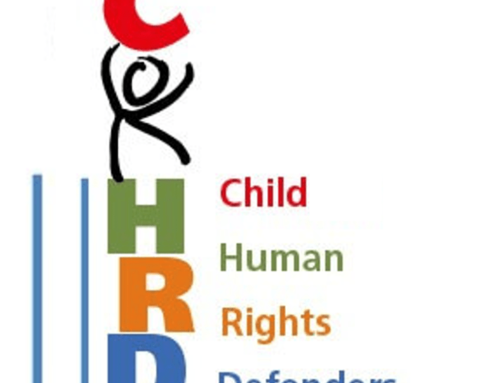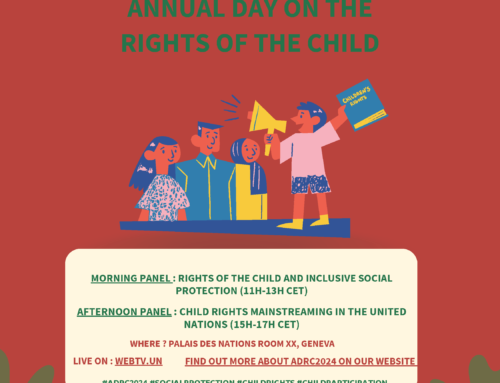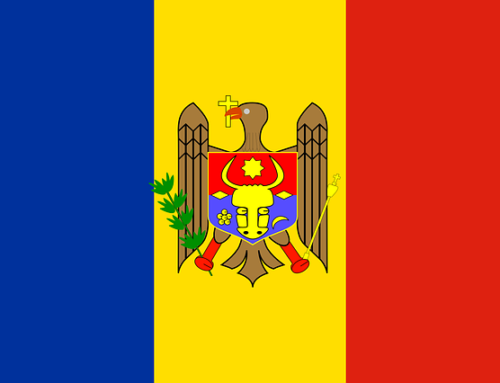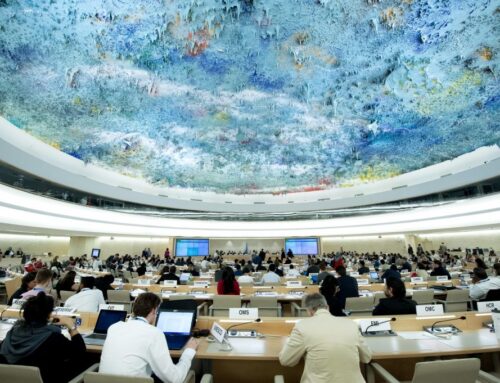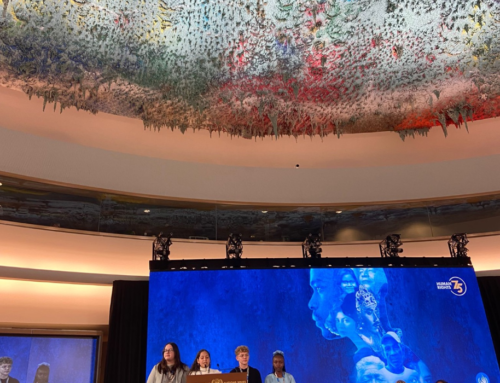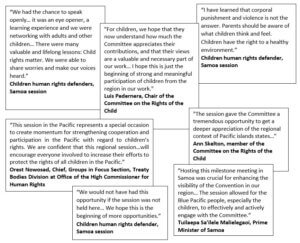 During the week of 2 March 2020, the UN Committee on the Rights of the Child (the Committee) held an extraordinary outreach session in Apia, Samoa – the first ever regional session of the United Nations Treaty Bodies. Child Rights Connect engaged and supported this remarkable and inspiring event.
During the week of 2 March 2020, the UN Committee on the Rights of the Child (the Committee) held an extraordinary outreach session in Apia, Samoa – the first ever regional session of the United Nations Treaty Bodies. Child Rights Connect engaged and supported this remarkable and inspiring event.
More than 100 children from Samoa and other Pacific islands engaged with the Committee; State delegations shared their challenges with the Committee, some with tears in their eyes; the Committee session was held before record numbers of civil society representatives during the States reviews; Child Rights Connect established connections with over 20 civil society organisations in the Pacific region. This was the extraordinary session in Samoa of the Committee on the Rights of the Child.
“We are happy to see the Committee’s commitment to include children directly in the session and we see this as a reflection of the Committee’s growing efforts to ensure that children are at the core of the monitoring and reporting of the UN Convention on the Rights of the Child.
The collaboration between the different UN bodies and agencies around this extraordinary session will have to be used as an example to build on to foster child rights mainstreaming within the UN at international, regional and national level.”
Child Rights Connect statement at the opening of the 84th extraordinary session of the UN Committee on the Rights of the Child
Months of preparations led to this moment which involved close collaboration with many different actors. This included establishing a close partnership with the Pacific Commonwealth Equality Project Regional Rights Resource Team (RRRT) who took a vital lead throughout the process jointly preparing a child participation strategy and child safeguarding materials with OHCHR (access them here); assisting the UN Resident Coordinator in Samoa and UNICEF Pacific in the preparations for child participation.
Child Rights Connect and RRRT ensured that civil society participation was at the core of the extraordinary session. Given the scarce number of child rights-focussed civil society organisations in the region, this was a unique opportunity to strengthen the capacity of grassroots organizations to engage with the Committee and the UN in a long-term and sustainable way. Child Rights Connect was engaged early on in publicising the session and engaging its members and all civic actors across the region, including children and indigenous peoples. We provided targeted advice and technical assistance to all those who participated in the session. According to civil society participants from Tuvalu, Tonga, Kiribati, Vanuatu, Federated state of Micronesia, Malaita Solomon Islands, Papua New Guinea and Cook Islands, our briefings and debriefings were key to learn more about the CRC reporting and the broader UN human rights system, as well as to discuss follow-up and good practices. “I received valuable support and tailored technical assistance from Child Rights Connect and as a result, felt much more confident and prepared to participate in the session activities”, said Teretia Tokam, representing the Kiribati Women and Children Support Centre (KWCSC).
Child Rights Connect undertook a training workshop on CRC reporting for civil society, with over half of those participating saying that this helped them to increase networking across the board, including with Child Rights Connect, RRRT, UNICEF and their governments. During the training, insightful and practical questions were raised about participating in the work of the Committee and broader queries around child participation, the Treaty Body system as a whole and linkages to the Universal Periodic Review.
The training was one of the daily side events happening in the framework of the session and taking place in the Talanoa Tent. In addition to the Committee’s country reviews of the Cook Islands, Federated States of Micronesia, Tuvalu and the pre-session of Kiribati, the extraordinary session included open lunchtime briefings, training sessions and discussions on priority themes ranging from environmental action and climate change, the right to health, protection from abuse and neglect, culture and faith and early childhood development in emergencies. Children were co-moderating and sharing their experiences as part of a space created for open and frank discussions on sensitive and timely topics.
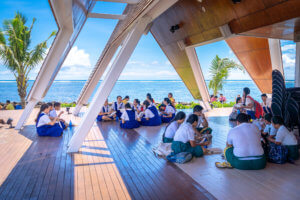
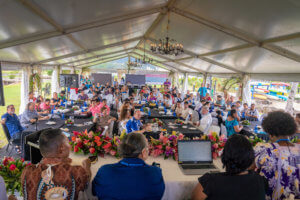
The Talanoa Tent (UN Photo/Alvaro Hoyos)
Training events focused on advocacy opportunities at the international level, including the Human Rights Council and the Sustainable Development Goals, as well as national mechanisms for reporting and follow-up. All this made the extraordinary session an unprecedented learning and capacity building experience for all the different stakeholders involved. Together with informal events, it created opportunities for valuable human and technical exchanges. It allowed children to share their views and experiences with the Committee, but also to challenge it on sensitive issues like corporal punishment, which according to them and others intervening during the session is a normalised practice in the region. This environment contributed to the record numbers of in-person and online attendance during the State party reviews. The exceptional media coverage of the session is also an indicator of the traction created by the extraordinary session in Samoa and the region.
“This 84th session will provide a unique opportunity to all those participating including State Delegates, representatives of the judiciary, representatives from civil society organisations and National Human Rights Institutions, to attend the various parallel events held in the Regional Rights Resource Team Talanoa Tent, to learn more about children’s rights, including child participation, the human rights processes such as the Universal Periodic Review and the work of the United Nations Special Procedures…These are very distant processes but they can have a positive and direct impact on your work. All of this, the whole package, would simply not have been possible in Geneva. Impossible in fact.”
Orest Nowosad, Chief, Groups in Focus Section, Treaty Bodies Division at Office of the High Commissioner for Human Rights (during the opening of the 84th session, recording here)
There was an emotional end to the week with a huge sense of achievement after so much hard work from all sides. “The session finds its place in the history of the UN Treaty Body System but this is only the beginning” said Clarence Nelson, member of the Committee on the Rights of the Child.
The Concluding Observations for Tuvalu, Cook Islands and Micronesia have to become reality for children. The review of Kiribati should lead to recommendations which are informed by the inputs provided by civil society and children. The views of the children who participated in the session will have to inform the Committee’s current and upcoming work. The children are expecting this and, on the last day of the session, they asked the Committee “How will the members put our ideas into action?”
Child Rights Connect commits to continue its efforts towards building strong partnerships and empowering children and new members across the region, to guarantee that the low levels of civil society reporting to the Committee becomes a distant past (see Child Rights Connect’s report Global Status of Engagement in Reporting to the UN Committee on the Rights of the Child).
We follow-up to the CRC Samoa session in a time of great distress for the region as it faces cyclone season during the global COVID-19 pandemic. Our thoughts are with them during these challenging months and we look forward to continued collaboration.




